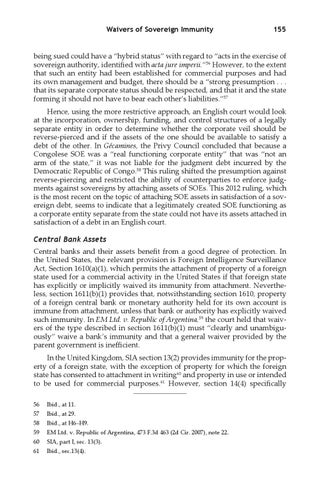Waivers of Sovereign Immunity
155
being sued could have a “hybrid status” with regard to “acts in the exercise of sovereign authority, identified with acta jure imperii.”56 However, to the extent that such an entity had been established for commercial purposes and had its own management and budget, there should be a “strong presumption . . . that its separate corporate status should be respected, and that it and the state forming it should not have to bear each other’s liabilities.”57 Hence, using the more restrictive approach, an English court would look at the incorporation, ownership, funding, and control structures of a legally separate entity in order to determine whether the corporate veil should be reverse-pierced and if the assets of the one should be available to satisfy a debt of the other. In Gécamines, the Privy Council concluded that because a Congolese SOE was a “real functioning corporate entity” that was “not an arm of the state,” it was not liable for the judgment debt incurred by the Democratic Republic of Congo.58 This ruling shifted the presumption against reverse-piercing and restricted the ability of counterparties to enforce judgments against sovereigns by a aching assets of SOEs. This 2012 ruling, which is the most recent on the topic of a aching SOE assets in satisfaction of a sovereign debt, seems to indicate that a legitimately created SOE functioning as a corporate entity separate from the state could not have its assets a ached in satisfaction of a debt in an English court.
Central Bank Assets Central banks and their assets benefit from a good degree of protection. In the United States, the relevant provision is Foreign Intelligence Surveillance Act, Section 1610(a)(1), which permits the a achment of property of a foreign state used for a commercial activity in the United States if that foreign state has explicitly or implicitly waived its immunity from a achment. Nevertheless, section 1611(b)(1) provides that, notwithstanding section 1610, property of a foreign central bank or monetary authority held for its own account is immune from a achment, unless that bank or authority has explicitly waived such immunity. In EM Ltd. v. Republic of Argentina,59 the court held that waivers of the type described in section 1611(b)(1) must “clearly and unambiguously” waive a bank’s immunity and that a general waiver provided by the parent government is inefficient. In the United Kingdom, SIA section 13(2) provides immunity for the property of a foreign state, with the exception of property for which the foreign state has consented to a achment in writing60 and property in use or intended to be used for commercial purposes.61 However, section 14(4) specifically 56
Ibid., at 11.
57
Ibid., at 29.
58
Ibid., at H6–H9.
59
EM Ltd. v. Republic of Argentina, 473 F.3d 463 (2d Cir. 2007), note 22.
60
SIA, part I, sec. 13(3).
61
Ibid., sec.13(4).
